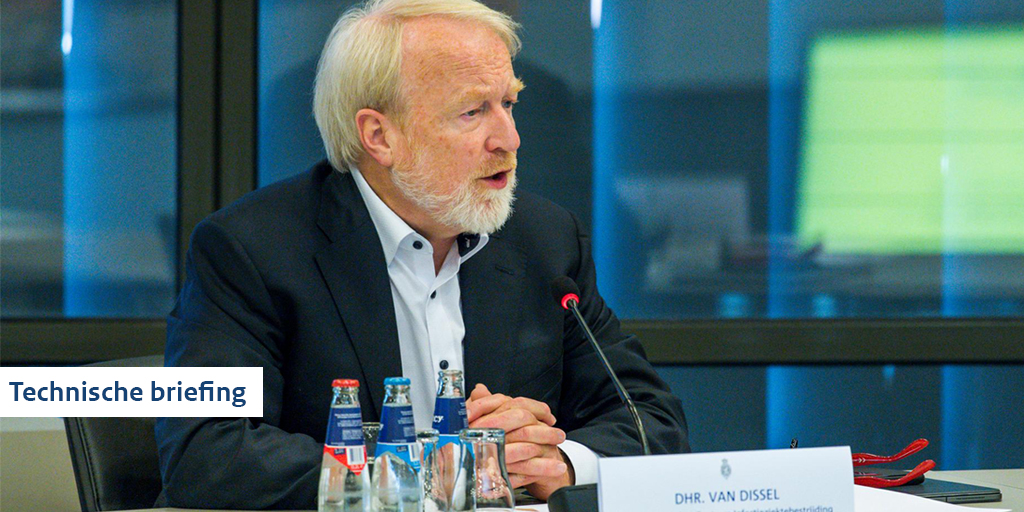Four TU Delft professors explain why they signed an open letter in which academics assert that Members of Parliament abuse their position to give researchers a bad name.
OMT chairman Jaap van Dissel has been discredited since the beginning of the corona outbreak. (Photo: RIVM)
The letter (in Dutch) was written by microbiologist Marc Bonten and virologist Marion Koopmans and was published in the Volkskrant. The list of signatories is available on the websites of the university medical centres. Of the signatories, 13 are linked to TU Delft.
What led to the letter is a contribution by the Forum voor Democratie political party to a debate in the House of Representatives about the Ministry of Health’s intervention (in Dutch) in the advice of the Outbreak Management Team (OMT). Member of Parliament Gideon van Meijeren accused the OMT Chair Jaap van Dissel of lying and corruption, and urged him to hand in his resignation.
The ultimate kick
“Unfortunately it was not a one off, but just one in a series of insults to academics by a certain section of Parliament” states the letter that warns that these types of accusations undermine trust in academia and jeopardise the safety of academics. Furthermore, sowing doubt leads to some people refusing vaccinations for the wrong reasons, in turn leading to some of them dying of Covid.
Van Meijeren was contradicted by the VVD, CDA, D66, Omtzigt, SP and Denk parties. “As though the man took a bribe from the Ministry,” said Denk Member of Parliament Tunahan Kuzu. “I totally reject this sort of nonsense.”
Taking a position
Interim Parliamentary Chair Martin Bosma (PVV) tried to bring Van Meijeren to order. “You continue to use very unpleasant harsh words that are completely unnecessary, and you use them against someone who is unable to defend himself here. I find that very offensive.” In the end he suspended the meeting.
Bonten and Koopmans believe that the Members of Parliament should adopt ‘an even stronger’ position. “Do not allow parliamentary immunity be abused to express unfounded accusations and unsubstantiated suspicions.”
‘Learn to distinguish between fallacies and academically founded accusations’
One of the TU Delft signatories is Lieven Vandersypen, Professor of Quantum Technology. He won one of the Spinoza awards last year. He plans to use part of the award (of EUR 2.5 million) to reverse what he calls ‘the undermining of democracy’. “I would like more people to learn to distinguish between fallacies and academically founded accusations,” he told Delta at the time.
“I signed the letter (in the Volkskrant) with total conviction,” he said. “I am highly concerned about the fact that a lot of people seem to be unable to distinguish between well-founded scientific findings from fake science or even completely made up ‘facts’. The very fact that you need to even discuss this means that it will be very difficult to deal with the major challenges of today as a society. Challenges such as climate, safety and health. My concerns meant that when I won the Spinoza Award, I announced that part of my award money will be spent on this.”
Vandersypen plans to see if it is possible to design learning materials for early childhood education that will help teachers handle this issue and prepare children.
Role of education
The education system plays a major role, believes Professor of Water Management Nick van de Giesen. “We are always perched on the edge of knowledge so it can sometimes appear as if academics disagree with each other, but the underlying principles are strong. The secondary school curriculum should incorporate this more as part of learning about ‘citizenship’.”
“We should continue to emphasise the huge success of scientific methodology. Two hundred years ago – in the time of your grandmother’s grandmother – the life expectancy in the Netherlands was 40 years. And we are now feeding eight times more people as then. This would have been impossible without science.”
Professor Wim Uijttewaal of Fluid Mechanics also signed the letter. “Discussions are more frequently pinned on the individual because the message bearers are more visible as individuals. This may be the downside of improved scientific communications. The worrying thing is that decisions become removed from more objective reality and that the message bearers may become reluctant to communicate.”
‘Be honest about conflicts of interest’
What can academics do? First, you need to be completely transparent about how research results were obtained and any possible conflicts of interest. “In the former, the academic methodology – with some exceptions – is robust and self-correcting. In the latter, conflicts of interest need attention.”
Academics do sometimes have commercial interests, such as in start-ups that emerge from research. The Professor believes that researchers need to be clear about this. “I believe that transparency and objectivity are the weapons of defence against the sowing of unsubstantiated suspicions.”
And the media? He believes that they should give greater thought to which ‘experts’ they pit against each other in societal debates that touch science. “Do not organise a discussion between an astrophysicist and a supporter of the ‘flat earth’ theory.”
Professor Matthijs Kok of Hydraulic Engineering, who also signed the letter, supports this position. “I see that a balanced interpretation is not of interest to many journalists. But I definitely do not want to pass the buck on to others. Academics need to self-reflect and always substantiate their position so that it is open for debate.”
HOP, BB / Delta Newsroom
Do you have a question or comment about this article?
redactie@hogeronderwijspersbureau.nl


Comments are closed.